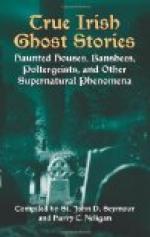[Footnote 14: Evening Telegraph for Dec. 10, 1913.]
An occurrence of very much the same description took place in County Clare about three years ago. Again the departed husband returns to his sorrowing wife, sits by the fire with her, chatting no doubt of old times, and before he leaves for the other world is regaled with pig’s head and plenty of whisky. The visit is repeated the next night, and a request made for money to play cards with down below: the wife willingly gives him the money. Again he comes, and again he borrows on the plea that he had lost the night before, but hoped to get better luck next time. On the woman telling a neighbour a watch was kept for the dead man’s return, but he never came near the place again.
An account of a police-court trial which appeared in the Irish Times of 31st December 1913 emphasizes in a very marked degree the extraordinary grip that superstition has over some of the country people. A young woman was on her trial for stealing £300 from the brother of her employer, Patrick McFaul of Armagh. District Inspector Lowndes, in opening the case for the Crown, told the bench that the money had been taken out of the bank by McFaul to buy a holding, for the purchase of which negotiations were going on. The money was carelessly thrown into a drawer in a bedroom, and left there till it would be wanted. A short time afterwards a fire broke out in the room, and a heap of ashes was all that was found in the drawer, though little else in the room besides a few clothes was injured. “The McFauls appeared to accept their loss with a complacency, which could only be accounted for by the idea they entertained that the money was destroyed through spiritual intervention—that there were ghosts in the question, and that the destruction of the money was to be taken as a warning directed




